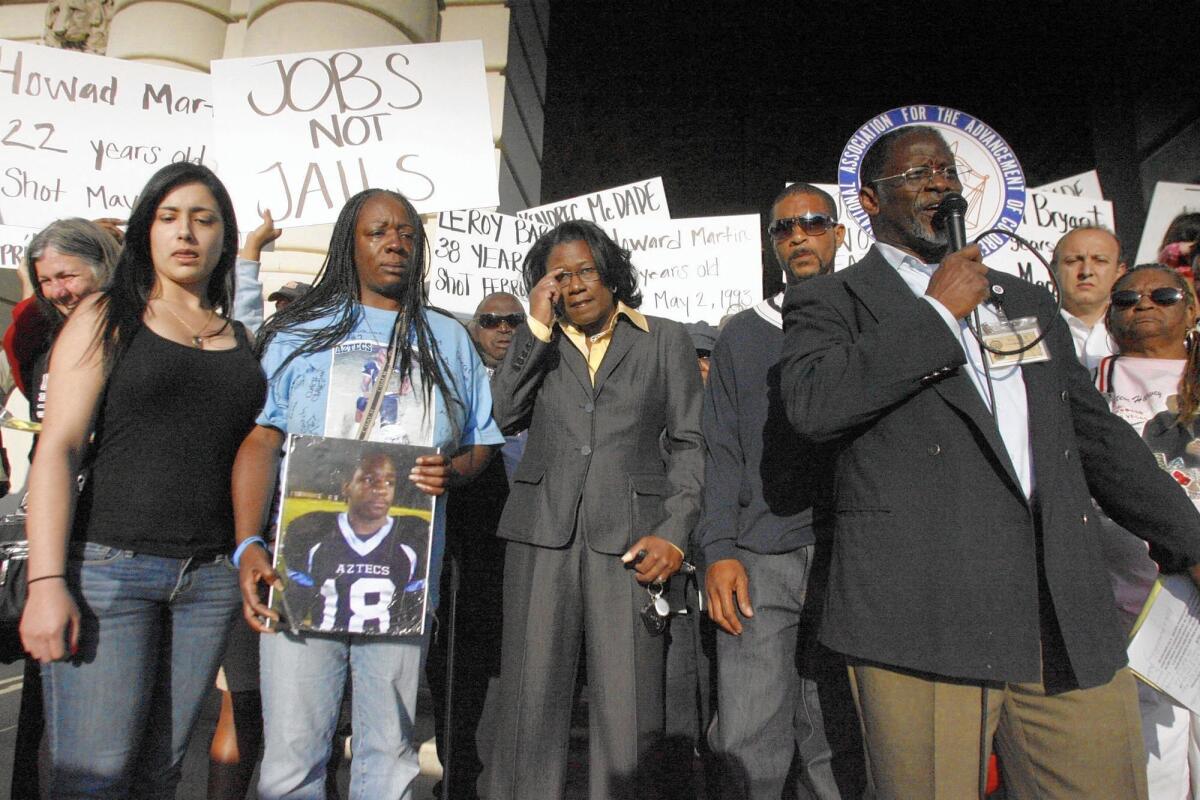Court hears case for secrecy of report on police shooting of unarmed black teen

Activists and family members of Kendrec McDade rally outside Pasadena City Hall in April 2012. McDade’s mother, Anya Slaughter, holds a photo of her son, who was shot to death by police.
- Share via
More than three years after two Pasadena police officers fatally shot an unarmed black teen, a state appeals court heard arguments Wednesday from the police union, which is trying to block release of an independent report on the killing.
Portions of that report released during the legal battle so far have called the slaying “troubling” and said the shooting was preceded by tactical mistakes.
For about two hours Wednesday, three judges from the 2nd District Court of Appeal questioned an attorney for the Pasadena Police Officers’ Assn. and attorneys representing those who want the report released, including the Los Angeles Times and the teen’s mother.
Richard Shinee, an attorney for the union, told the justices that the two officers involved gave voluntary statements to criminal homicide investigators. But, he said, the department used those statements in a subsequent personnel review.
“The chief of police relied on those statements to decide if they violated [administrative] policy,” Shinee said.
The report conducted by an independent consultant for the city used the private personnel information, which means the entire report should be withheld from the public, he said.
The report has been kept secret since it was completed last summer. The Pasadena police union representing Officers Jeffrey Newlen and Matthew Griffin, who shot and killed Kendrec McDade on March 24, 2012, sued to block the report’s release. The union contended the assessment of the officers’ actions was legally protected personnel information.
But the justices on Wednesday during oral argument seemed to question the notion that anything garnered from elsewhere and put into a personnel file is prohibited from disclosure.
Justice Jeffrey Johnson wondered if the phone book gets protection if it was put into the personnel file of an officer.
“It like is a black hole into which everything gets sucked,” he said of the personnel file idea. He suggested that by the union’s construction, no shooting investigation should be public.
Presiding Justice Francis Rotherschild suggested it would be stretch to withhold the entire report, noting the privacy protection is for officers, not an entire department.
The appellate case stemmed from a ruling in November when Los Angeles County Superior Court Judge James Chalfant decided that most of the independent consultant’s report could be made public, with limited redactions. The police union filed a petition with the appellate court to stop the release.
Kelli Sager, representing The Times, told the justices she believed that they had the power to redact even less of the report than Chalfant. Sager said only records generated with the purpose of appraisal or discipline are personnel records and the report unsealed was neither. She warned that the department would simply “sweep up everything” into personnel files.
The case illustrates the growing divide between police unions and the public when it comes to officer accountability. Sager said there was no question that given the national climate, the public has more interest than ever in police officers’ use of deadly force.
“We are talking about a young man shot eight times,” she told the justices about McDade.
McDade was being pursued by officers on Sunset Avenue when Griffin, in in a police car, cut off his path with the vehicle and seeing his hand at his waistband, shot him, according to prosecutors.
Newlen, chasing on foot and believing his partner had come under fire, shot the teenager as well.
The Pasadena Police Officers’ Assn. included significant portions of the report in legal papers filed with the appellate court.
The report by the Office of Independent Review consulting group found Griffin and Newlen made faulty tactical errors, including a lack of communication between the officers, their decision to enter a narrow alleyway and put themselves in a vulnerable position, and closing their distance on a suspect they believed was armed based on a false 911 report.
“They repeatedly made tactical decisions that were not congruent with principles of officer safety,” the report concluded, according to excerpts contained in the union filing.
Such tactical mistakes by officers putting themselves in a position of danger led to “the eventual perceived need to use deadly force,” the report said.
The report called certain maneuvers by Griffin “troubling,” and concluded the officer made a “potentially disastrous mistake” when he got out of the patrol car without putting it in park. Newlen separated himself from his partner to chase McDade, even though department policy prefers that officers stay together during foot pursuits, the report stated.
Both officers were cleared of wrongdoing in the Police Department’s internal review and by the Los Angeles County district attorney’s office. Pasadena paid about $1 million to settle wrongful-death suits brought by McDade’s parents.
To follow Southern California crime @lacrimes
More to Read
Sign up for Essential California
The most important California stories and recommendations in your inbox every morning.
You may occasionally receive promotional content from the Los Angeles Times.














